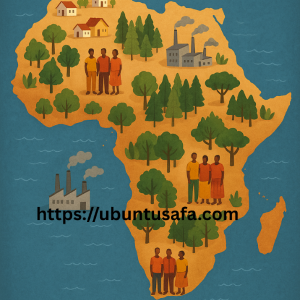"Why African Voices Are Critical in Global Conversations"

African voices are not just important; they are critical for shaping a truly comprehensive, equitable, and effective global discourse. For too long, narratives about Africa have been shaped from external perspectives, often perpetuating stereotypes or overlooking the continent's immense complexities, contributions, and potential.
Here's why African voices are indispensable in global conversations:
1. Unpacking Global Challenges with Unique Perspectives:
-
Climate Change: Africa, contributing minimally to global emissions, bears the disproportionate brunt of climate change impacts. African voices are crucial for highlighting climate injustice, advocating for equitable climate finance, and sharing on-the-ground adaptation strategies. Their experiences provide vital context that is often missing from discussions dominated by major emitters.
-
Global Health: Africa has unique insights and experiences in tackling pandemics and endemic diseases (e.g., HIV/AIDS, Ebola, malaria, COVID-19). African health experts offer invaluable lessons in community mobilization, rapid response, and resilience, which are critical for global health security.
-
Migration and Displacement: With significant internal displacement and cross-border migration often driven by climate change, conflict, and economic factors, African voices provide human-centered perspectives on the root causes of migration and the need for humane, collaborative global policies.
-
Peace and Security: African nations and regional bodies (like the African Union) are increasingly taking ownership of peace and security challenges on the continent. Their perspectives on conflict resolution, post-conflict reconstruction, and preventive diplomacy are essential for global stability.
2. Driving Innovation and Sustainable Development:
-
Homegrown Solutions: African innovators are developing unique, context-specific solutions to local challenges in areas like mobile banking, renewable energy, and agriculture. These innovations, born out of necessity and resourcefulness, offer valuable models for other developing regions and even insights for developed nations. African voices highlight the ingenuity and resilience that often go unnoticed.
-
Demographic Dividend: Africa has the world's youngest and fastest-growing population. The insights and aspirations of this massive youth demographic are critical for understanding future global labor markets, consumer trends, and social dynamics. Investing in and listening to African youth is investing in the future of the global economy.
-
Sustainable Development Goals (SDGs): Africa's progress is central to achieving the SDGs. African voices provide the crucial on-the-ground reality check, highlight bottlenecks, and share best practices in areas like poverty alleviation, education, and gender equality.
3. Enriching Global Culture, Arts, and Thought:
-
Cultural Influence: African music (Afrobeats, Amapiano), fashion, literature (Afrofuturism, Africanfuturism), and culinary traditions are increasingly gaining global recognition and influencing trends worldwide. African creators are reclaiming their narratives and showcasing the continent's vibrant diversity and creativity, challenging monolithic and often negative stereotypes.
-
Philosophical Contributions: Traditional African philosophies, such as Ubuntu (emphasizing interconnectedness and humanity), offer profound ethical and social frameworks that can enrich global dialogues on human rights, community, and governance.
-
Historical Accuracy: African voices are essential for decolonizing history and providing accurate accounts of Africa's rich pre-colonial empires, contributions to global trade, science, and the arts, and the true impact of colonialism and slavery. This re-balancing of historical narratives is vital for a more just and informed world.
4. Rebalancing Global Power Dynamics and Multilateralism:
-
Addressing Historical Inequities: For centuries, Africa has been largely a recipient of global policies rather than an equal partner in shaping them. Including African voices at decision-making tables (e.g., G20, UN Security Council, Bretton Woods institutions) is crucial for correcting historical imbalances and fostering more equitable global governance.
-
Promoting Multilateralism: African nations often advocate strongly for multilateral approaches to global challenges, emphasizing cooperation, solidarity, and shared responsibility—values that are increasingly vital in a fragmented world.
-
Diverse Perspectives on Geopolitics: African nations maintain diverse diplomatic ties and offer unique perspectives on evolving global power dynamics, non-alignment, and multipolarity, contributing to a more nuanced understanding of international relations.
5. Counteracting Misinformation and Stereotypes:
-
By speaking for themselves, African voices directly challenge the persistent stereotypes and misrepresentations that have long plagued the continent. They replace one-dimensional narratives of poverty and conflict with stories of innovation, resilience, hope, and agency.
-
Digital platforms have empowered a new generation of African content creators, journalists, and activists to share their realities directly with the world, bypassing traditional media filters.
In essence, ignoring African voices in global conversations is not just a matter of injustice; it's a strategic oversight. Africa represents a significant portion of the world's population, a wealth of untapped potential, unique cultural assets, and critical insights into the world's most pressing challenges. For any global conversation to be truly effective, comprehensive, and equitable, African voices must be at its very heart.
- Questions and Answers
- Opinion
- Motivational and Inspiring Story
- Technology
- Live and Let live
- Focus
- Geopolitics
- Military-Arms/Equipment
- Güvenlik
- Economy
- Beasts of Nations
- Machine Tools-The “Mother Industry”
- Art
- Causes
- Crafts
- Dance
- Drinks
- Film/Movie
- Fitness
- Food
- Oyunlar
- Gardening
- Health
- Home
- Literature
- Music
- Networking
- Other
- Party
- Religion
- Shopping
- Sports
- Theater
- Health and Wellness
- News
- Culture

